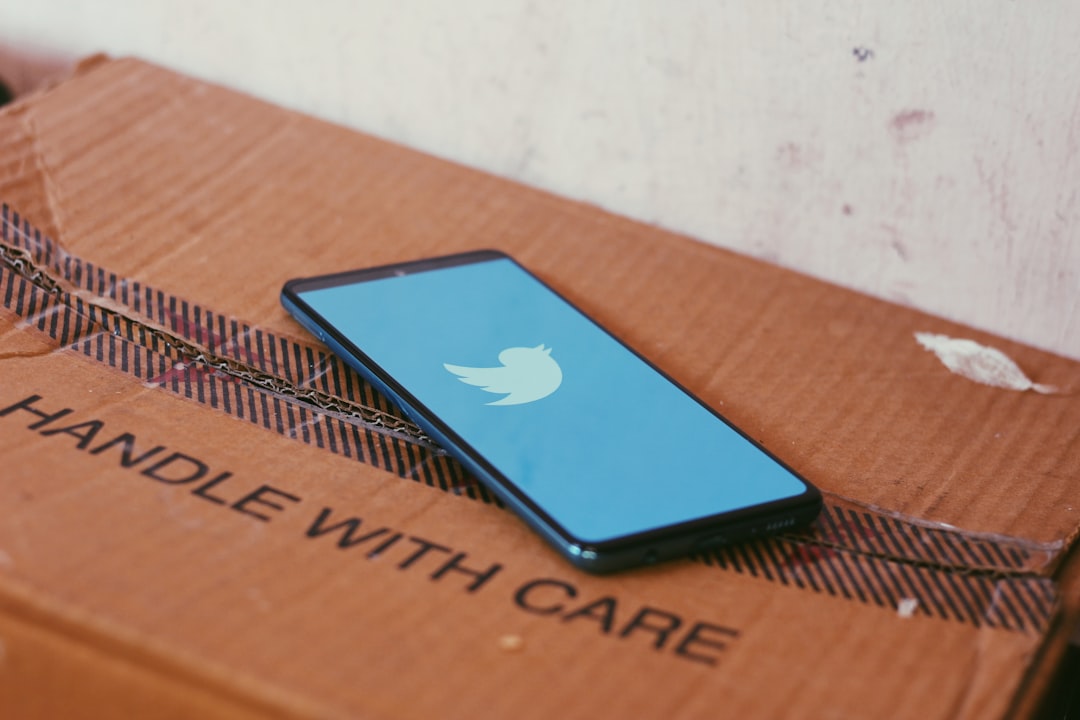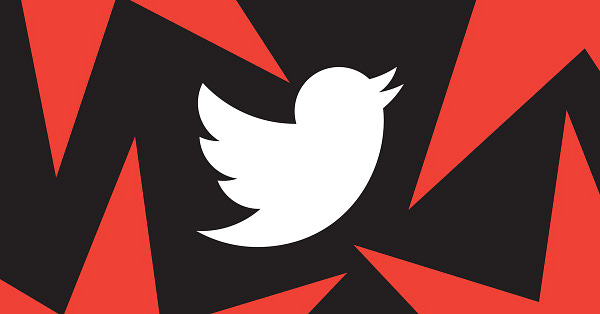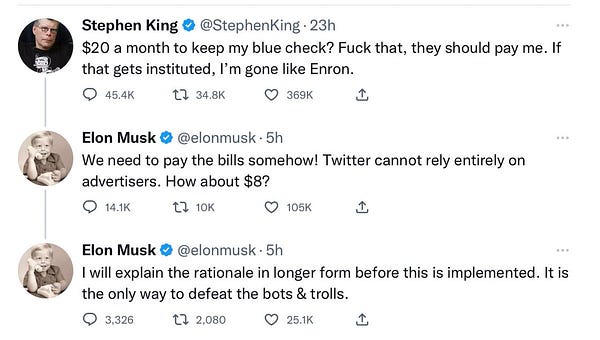What is Elon Musk Doing with His New Toy?
Moving fast and breaking things at Twitter.

Back in May, when billionaire playboy Elon Musk first offered to buy Twitter, the hard-working staff at Spoiler Alerts speculated that everyone’s worst-case fears might be overstated. Sure, Musk might run the company into the ground, but that overlooked the very simple fact that Musk needed to make money to ameliorate his creditors:
To complete the sale… Musk had to secure funding from banks. He cannot run it as a public trust, he has to show increased profits. That requires cost-cutting, continued growth and new revenue sources. The former is possible, but carries risks. As Reuters reported, “some banks … feared Musk’s unpredictability could result in an exodus of talent from Twitter, harming its business.” An exodus of talent cuts costs but not in the good way….
After watching Musk tweet for the past week, I don’t think he is any worse than Twitter’s founder or his successors. Rather, Musk seems like the archetype of a plutocrat who aspires to be a thought leader, makes mistakes when he drifts outside his area of expertise and has surrounded himself with people feeding his ego because they are afraid to speak truth to money.
I suspect Twitter will not change all that much if Musk actually buys it. If it does become a free-for-all, that will be bad for the public sphere — but even worse for Musk’s bottom line.
Less than a week into Musk’s new tenure as Twitter overlord, it’s not looking good for those creditors:


As the owner and operator of Drezner’s World, I can’t tolerate such bad takes. I have therefore fired the entire hard-working staff from the Spoiler Alerts era and replaced them with a young and hungry staff for Drezner’s World. I have also ordered them to produce more profitable takes by Friday or they are fired as well.
I kid, but the ethos of the previous paragraph sure seems to be Musk’s approach to running Twitter. One of his first actions was to fire the corporate officers “who understood Twitter’s business the best.” According to The Atlantic’s Damon Beres and Charlie Warzel, it was a bad first weekend:
According to conversations we’ve had with Twitter employees from different divisions of the company, staffers are packing their bags. They say the user experience may plunge into all-out bedlam over the coming days. Never an especially well-balanced environment to begin with, Twitter now faces a series of nightmare scenarios under Musk’s leadership that could further destabilize the platform, subjecting a greater number of people to more offensive content as fewer employees operate the safety valves. We’re about to see how bad things can really get….
“Even if you ideologically agree with him, unless you love being a replaceable cog who has to dance on command, this is not a workplace to be in,” a Twitter employee, who requested anonymity for fear of professional repercussions, told us yesterday. “As for users, you should already be seeing the influx of hate speech. Porn was already taking over, and it will get worse.”
Matthew Yglesias was far more optimistic about Musk’s ability to improve Twitter, suggesting that, “part of what makes me relatively optimistic about the Musk Ascension is that Elon Musk enjoys Twitter, which didn’t seem to be the case for Twitter’s prior board or even its top executive team… If you think of Twitter as a product with tremendous value but also a lot of functional limitations, then Musk plausibly can make iterative improvements to the product.”
Musk’s actual behavior, however, suggests that he is less interested in improving the product and more interested in boosting revenue. His first idea? Charging users for their identity verification! Of course, there has been some haggling about the price.

There are several reasons to be skeptical that this will pan out. The most obvious point is that most blue checks don’t get enough of value from the site to justify the expense. Another obvious point is that it is the power users who are providing value to Twitter and not vice versa. A slightly less obvious point is that there are plenty of trolls who would be delighted to pay $8 a month to enhance their behavior. This might provide a short-term boost to Musk’s bottom line but it will also diminish Twitter’s utility to everyone else, thereby devaluing the site.
This connects with something James Ball noted in the New Statesman, “the Twitter Elon Musk has inherited is one that is failing to engage its most active users. These are people defined by Twitter as posting a mere three to four times a week and the network is losing them already. This is a terrible time to ask people for money.” Celebrities were already starting to leave the site after Musk’s purchase; asking folks to pay for the privilege of the blue checkmark will likely accelerate that process. The ask feeds into a long-standing suspicion that anything Silicon Valley offers up for free is in actuality a long con designed to entrap customers.


Musk told Twitter’s advertisers that he wanted to make sure the site did not become a “free-for-all hellscape.” At the same time, however, Bloomberg reported that the company had scaled back the ability of Twitter’s Trust and Safety unit to engage in content moderation. Combined with Musk’s own shitposting over the past week, it seems hard to see how either advertisers (or regulators) will be placated.
Look, maybe this will all work out in the end. If enough people are willing to pay $8 a month to get a blue checkmark, then Musk will have indeed found a new revenue stream. But it is interesting to compare and contrast how, say Jeff Bezos approached the takeover of the Washington Post with Musk’s purchase of Twitter. Bezos has some interesting ideas on distribution but by and large did not interfere too much with the media company. Musk, in contrast, is acting like he knows better than anyone else (probably because that’s what his acolytes tell him and he tunes out everyone who disagrees). This is a recipe for taking big swings, missing badly, and watching an already flawed website become so dysfunctional that it collapses in value.
I’m staying on Twitter for now to see how things shake out. Like Yglesias, I have enjoyed the site and do not want to leave a network that has earned me many friends and colleagues. The alternatives do not look ready to scale just yet. But there is no denying that its utility is trending downward. Staying the site is starting to feel like rubbernecking at a highway crash. The question is whether Musk moves down the learning curve fast enough to course correct — or decides to do to Twitter what Peter Thiel did to Gawker.



I'm not particularly inclined to spend money to help Musk out of this mess, but on principle I don't object to subscription software and after having been repeatedly burned by Google in some ways I trust that model more. I've been having a good experience with Discord and so when they offered a low cost basic membership version with some perks, I signed up.
But making it about trashing blue check marks as an elite rather than a "we need a more sustainable revenue base, pay to get a better UX experience" seems like the sort of unforced error that comes from turning away non-loyalist advisors and not listening to existing staff that I bet have studied this question.
My theory: Musk is secretly being paid by George Soros to destroy Twitter.